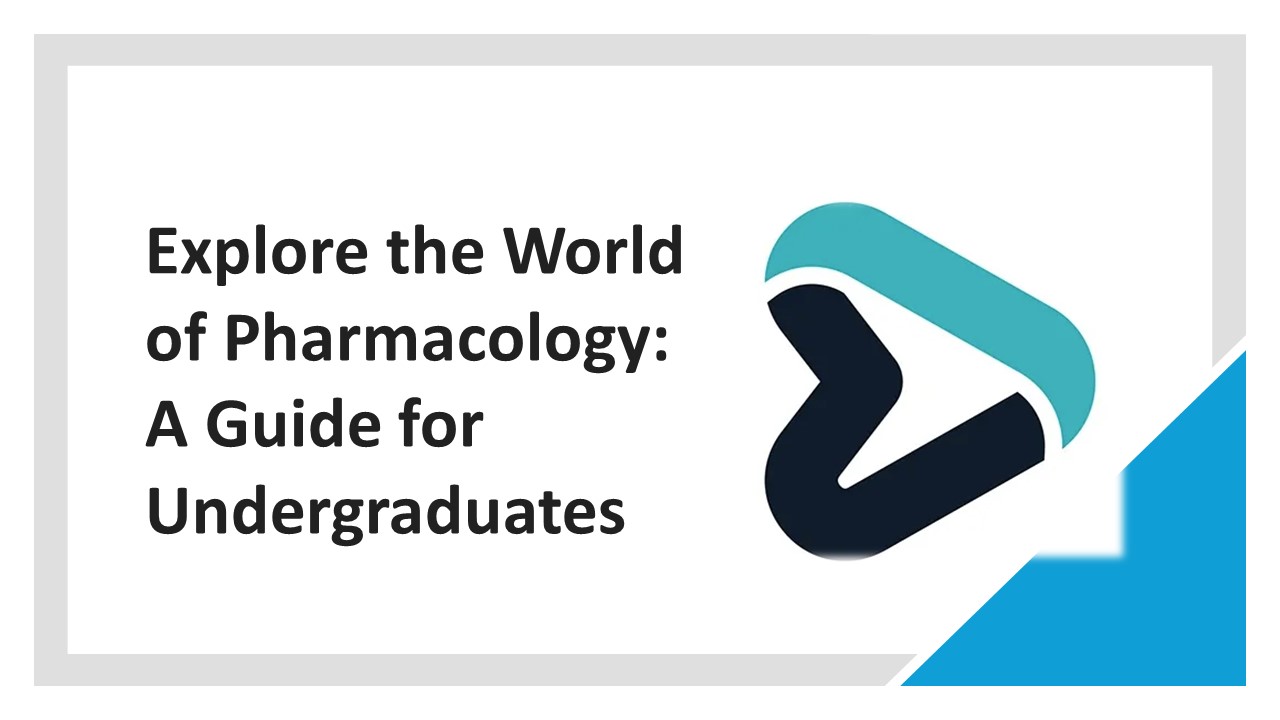Explore the World of Pharmacology- A Guide for Undergraduates
Title: Explore the World of Pharmacology- A Guide for Undergraduates
1
Explore the World of Pharmacology A Guide for
Undergraduates
2
The word "pharmacology" has roots in ancient
Greek"pharmakon" translates to "drug," and
"logia" means "knowledge of." Pharmacologists are
scientists and medical professionals who study
the mechanisms of medications, investigate the
effects of various drugs and chemicals on the
body, and develop new pharmaceuticals. Intrigued
much? You might want to explore a career in
pathology, then.
3
Below are a few advantages of pursuing
pharmacology as an undergraduate Abundant
Career Opportunities With a pharmacology degree,
many jobs in the pharmaceutical sector are up for
grabs. For example, as a pharmacologist, one can
pursue clinical research and contribute to
medical publications. Other careers to explore
include biomedical science, analytical chemistry,
pharmacy technician, and quality control
technician. An opportunity to make a real
impact Pharmacologists play an important role in
the development of drugs to cure diseases, both
existing and new. Even small innovations can
change the outcomes of treatments. Contributing
to the development of new drugs gives
pharmacologists immense job satisfaction.
4
Intellectual Challenge Pharmacology is not
for the simpletons. It is for those who enjoy
critical thinking, loves to build knowledge, can
find various ways to solve a problem and be
creative in their thinking. We are talking about
learning endless intricate drug mechanisms, going
through complex clinical trials, and spending
hours on research. Exposure to Different
Subjects Pharmacology is a combination of
various disciplines such as chemistry, biology,
biochemistry, and physiology. Therefore, the
stream allows for building strong foundations in
all these subjects.
5
In addition to mastering several subjects,
pharmacology students also get hands-on
laboratory experiences and research
opportunities. The content of a course in
pharmacology sometimes varies from institution to
institution however, some topics are more or
less permanent. At the core of the domain are
the Principles of Pharmacology, which introduce
this multifaceted field of medicine. Important
topics include the categorization of drugs,
and pharmacokinetics, which explore how drugs
travel through the body. Students also get to
learn about the impact of the chemical structure
of drugs on their potency, efficacy, and safety
profile. Another important topic is molecular
pharmacology, where students get to learn how
medications interact with specific biological
targets and receptors. Furthermore, the
Pharmacology of Specific Organ Systems allows
students to understand how several drugs are used
to modulate organ function and treat associated
disorders.
6
If you're considering a career as a
pharmacologist, opting for an online pharmacology
course is a natural step. Pharmacology online
courses offer a simple, convenient way for
students to clarify their basic pharmacology
concepts and stay updated on the latest in the
domain. When you learn pharmacology online, you
save money -without the need for physical
infrastructure, commuting expenses, or
accommodation costs, online pharmacology courses
are an affordable choice for students. At the
same time, these courses can be accessed from
anywhere on the globe at any time of the day,
making them super accessible to students who
cannot afford to enrol in an offline course in
pharmacology in a distant city. DigiNerve's new
course - "Pharmacology for Undergraduates", has
been designed to offer students a structured yet
engaging training module. Interactive learning
tools, multimedia resources, and virtual
laboratories add to pharmacological concepts'
understanding, retention, and application.
Developed by Dr Sandeep Kaushal and Dr Nirmal
George, this course focuses on understanding as
opposed to rote memorization.
7
The course content includes Orientation to
Pharmacology, Pharmacokinetics Absorption
Distribution, Pharmacokinetics Metabolism,
Elimination Kinetics of Elimination,
PharmacodynamicsDose-Response Relationship
Combined Effect of Drugs, Adverse Drug Reactions
(ADR) Pharmacovigilance, Adrenergic System
Actions Endogenous Agents, Prostaglandins,
Non-Steroidal Analgesics, and NSAIDS
Anti-Rheumatoid Drugs. Pharmacology for
Undergrads offers more than 58 hours of video
lectures, more than 2400 self-assessment
questions, and notes covering 71 topics. This
course places a significant emphasis on
application-based learning and adding to the
clinical knowledge of topics.
8
To improve participants' comprehension and
memory, the lectures are heavily illustrated with
pertinent graphics in addition to flowcharts,
tables, and boxes. The animations aid the
students in connecting the ideas to things they
encounter every day. Pharmacology notes and
multiple-choice questions (MCQs) accompany every
topic and serve as a handy reference for review.
In addition, questions with answer keys are given
for self-evaluation after each session. All
pertinent practicals have also been covered to
assist students in getting ready for their
practicals and viva. All DigiNerve online
courses are constantly updated to give students
current and relevant information. New research
findings, case studies, drug discoveries, and
treatment modalities are constantly added to the
courses, making them a valuable educational
resource for students. DigiNerve, with more than
a decade of experience under its belt, offers the
most in-depth and engaging online courses for
medical students.
9
Let's connect for more-
Support- care_at_diginerve.com
Enquiries- 91 8800 418 418

